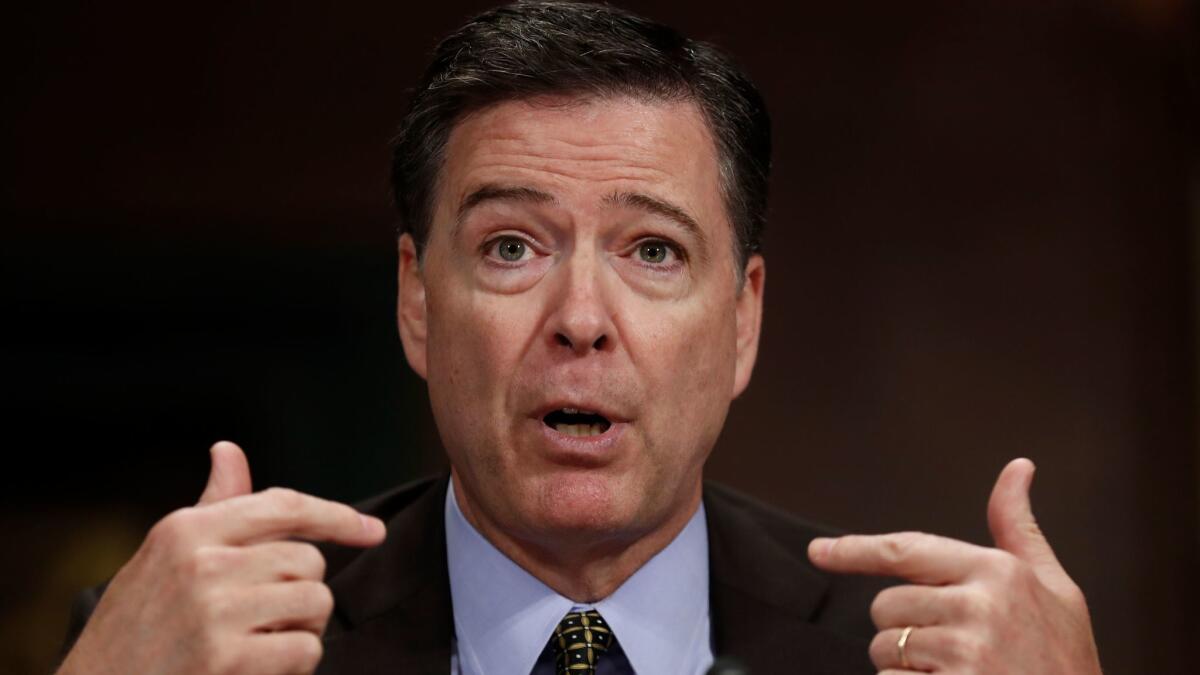Trump fires Comey as FBI director; Democrats call for a special prosecutor in Russia investigation

Reporting from Washington — President Trump fired FBI Director James B. Comey on Tuesday, stunning Washington with a decision that carries vast political ramifications because the bureau is investigating whether anyone close to the president colluded with Russian intelligence agents to influence the 2016 presidential election.
The abrupt ouster was needed to allow a “new beginning” at the FBI, Trump said, citing scathing criticism by Deputy Atty. Gen. Rod Rosenstein, a career prosecutor, of Comey’s public announcements about the bureau’s investigation of Hillary Clinton’s email practices.
The firing — the first dismissal of an FBI chief since 1993 — caught Comey by surprise as he spoke to FBI agents at an event in Los Angeles.
“He was caught flat-footed” when the news flashed on television screens in the room, a senior FBI official told reporters before Comey headed back to Washington. Comey skipped a scheduled event at the Directors Guild of America aimed at recruiting more minority agents.
The dismissal drew immediate calls from senior Democrats for an independent prosecutor to oversee the counterintelligence investigation into Trump associates’ ties to Russia, an inquiry that could lead to criminal charges.
As Trump’s political opponents compared the firing to President Nixon’s order to dismiss the Watergate special prosecutor more than four decades ago in what became known as the “Saturday Night Massacre,” even some members of Trump’s party expressed concern.
Sen. Richard M. Burr (R-N.C.), the head of the Senate Intelligence Committee, which is conducting a Russia investigation of its own, said he was “troubled by the timing and reasoning” of the firing, which he said “further confuses an already difficult investigation.” Comey’s departure, he added, was “a loss for the bureau and the nation.”
Senate Minority Leader Charles E. Schumer (D-N.Y.) said he told Trump, who called to notify him before making the firing public, “You’re making a very big mistake.”
Atty. Gen. Jeff Sessions sent an email to FBI employees Tuesday saying that Andrew McCabe would take over as acting director. McCabe, an FBI employee since 1996, was named deputy director in January 2016. He supervised sensitive investigations, including the inquiry into whether Clinton mishandled classified information in using a private email server when she was secretary of State.
McCabe visited the White House on Tuesday night, but officials said he did not meet with Trump.
For the last 10 months, Comey has come under sharp, widespread criticism from both parties for his handling of two investigations connected to the 2016 presidential election — the Russia investigation and the Clinton email inquiry.
Trump said he had relied on the recommendation of Rosenstein, who assumed his job late last month and is overseeing the FBI’s handling of the Russia investigation because Sessions has stepped aside from any role in it.
In a memorandum to Sessions, which was released by the White House, Rosenstein harshly criticized Comey for his actions beginning last summer.
On July 5, Comey announced at a news conference that the FBI would not seek criminal charges against Clinton, the Democratic nominee, in the investigation of her email practices, but he also denounced her conduct as “extremely careless.”
That was a serious misjudgment, Rosenstein wrote, adding, “The goal of a federal criminal investigation is not to announce our thoughts at a press conference.”
Comey’s actions were “a textbook example of what federal prosecutors and agents are taught not to do,” he wrote.
Rosenstein said Comey made the problems worse with his decision in late October — 11 days before the election — to disclose that the FBI had reopened its investigation of the Clinton case after finding State Department emails on a computer belonging to former Rep. Anthony Weiner, the subject of a separate investigation and the estranged husband of Clinton’s aide Huma Abedin.
After a week, the FBI determined that those emails added no significant new evidence to the case.
The president has removed the sitting FBI director in the midst of one of the most critical national security investigations in the history of our country.
— Sen. Patrick J. Leahy (D-Vt.)
Clinton has blamed the Comey letter for contributing to her defeat, although polling evidence on that point is unclear.
Trump had loudly praised Comey’s announcement at the time.
Many Republicans had reacted with outrage in July when Comey said the bureau would not seek charges against Clinton.
Many Democrats were equally upset with his wide-ranging comments on Clinton’s conduct. Their anger deepened with his letter in October and Comey’s disclosure to Congress in March that the FBI launched an investigation last July into possible coordination between Trump associates and Russia — an inquiry Comey did not reveal during the campaign.
Comey told the Senate Judiciary Committee last week that the criticism he had received for his actions in the campaign had been “painful.”
“I’ve gotten all kinds of rocks thrown at me, and this has been really hard, but I think I’ve done the right thing at each turn,” he testified. He added that he welcomed an FBI inspector general’s review of his conduct, which was announced in January.
But Comey argued that he had no choice but to disclose the renewed investigation just before the election and not “conceal” it.
Rosenstein sharply disagreed. Prosecutors should never disclose nonpublic information about investigations, he wrote. “Silence is not concealment.”
Given Comey’s errors and his public refusal to admit that they were mistakes, Rosenstein continued, “the FBI is unlikely to regain public and congressional trust until it has a Director who understands the gravity of the mistakes and pledges never to repeat them.”
Rosenstein’s recommendation “was presented to the president today,” White House Press Secretary Sean Spicer told reporters several hours after the firing. “No one from the White House” ordered Rosenstein to conduct his review, Spicer added. “It was all him.”
White House officials, hoping to insulate the president from opposition criticism, released past quotes from top Democratic leaders declaring a lack of confidence in Comey.
Democrats, however, said that nothing Comey did last year justified Trump’s firing him now. In statements, leading Democratic lawmakers called his ouster “outrageous,” “brazen” and “not what an innocent person would do.”
They warned that Comey’s dismissal could lead to a White House effort to shut down the FBI investigation.
“No one should accept President Trump’s absurd justification” for the firing, declared Sen. Patrick J. Leahy (D-Vt.), the former head of the Senate Judiciary Committee.
“The president has removed the sitting FBI director in the midst of one of the most critical national security investigations in the history of our country — one that implicates senior officials in the Trump campaign and administration. This is nothing less than Nixonian,” Leahy said.
Sessions, in a letter to Trump, said that he was recommending Comey’s dismissal “for the reasons expressed by the Deputy Attorney General” and in order for the department to “clearly reaffirm its commitment to longstanding principles” of proper conduct by investigators.
Trump, in a letter to Comey informing him of his dismissal, said he had accepted the recommendation.
He added that he “greatly appreciate[d] you informing me on three separate occasions, that I am not under investigation.”
That claim was not independently confirmed, and White House officials would not explain when the three occasions were. Officials familiar with the investigation have said that the FBI inquiry has focused on Trump associates and have not suggested that the president himself is a target.
In a statement, the White House quoted Trump as saying that “the FBI is one of our nation’s most cherished and respected institutions and today will mark a new beginning for our crown jewel of law enforcement.”
Although the FBI director serves a fixed 10-year term, which is supposed to insulate him from political pressure, previous presidents of both parties have taken the position that as an officer of the executive branch, the director can be fired by the president. The last such dismissal was in 1993 when President Clinton fired Director William Sessions amid allegations of ethics violations.
A search for a new permanent FBI director will begin immediately, the White House said.
Sen. Dianne Feinstein of California, the top Democrat on the Senate Judiciary Committee, said Trump called her Tuesday afternoon to relay his decision.
“The next FBI director must be strong and independent and will receive a fair hearing,” she said.
But nominating and ultimately confirming a new director in such a politically toxic environment will be an extraordinarily difficult task.
That prospect troubled some current and former FBI agents.
The FBI’s reputation for independence will now be under threat, said Frank Scafidi, a 20-year veteran of the bureau who ran its public affairs and congressional relations offices before retiring in 2004.
“There will always be a cloud of suspicion hanging over the head of whoever it will be,” Scafidi said, speaking by telephone from his home in Sacramento.
Democrats will intensely scrutinize any Trump pick in part because of the president’s comments and those of his administration attacking the judiciary and investigatory agencies.
Just Tuesday, the White House questioned the public assertions and private actions of former Deputy Atty. Gen. Sally Yates, who testified Monday at a Senate panel hearing about concerns she had raised with the White House that then-national security advisor Michael Flynn had been compromised through misleading public statements about his interactions with Russian officials.
Spicer suggested Yates was acting as a pro-Clinton partisan, and said without evidence that she was “widely rumored to play a large role” in a Clinton administration.
President Obama nominated Comey in 2013 to replace Robert Mueller, who had served beyond the typical 10-year term of an FBI director in part because of the difficulty in finding a replacement amid continuing national security threats. Comey was easily confirmed by the Senate.
In choosing Comey, a Republican, the Obama administration highlighted his credentials as a federal prosecutor and his apolitical manner.
Trump at first appeared inclined to keep Comey in his position. Two days after his inauguration, Trump singled him out during a gathering with law enforcement officials in Washington, shaking his hand and patting him on the back.
“He’s become more famous than me,” the president quipped.
Last week, after Comey’s Senate testimony, Spicer said that “the president has confidence in the director.”
On Tuesday, however, speaking to reporters at his afternoon briefing, Spicer hedged on whether Comey still had that confidence.
“I have not asked the president since the last time we spoke about this,” Spicer said.
He returned to the briefing room hours later with news of the firing.
Times staff writers Noah Bierman, Brian Bennett, Evan Halper, Lisa Mascaro and Joseph Tanfani in Washington and James Queally in Los Angeles contributed to this report.
ALSO
Donald Trump is too inept to conduct a successful coverup
Trump’s shifting stances on FBI Director James Comey
UPDATES:
8:40 p.m.: This article was updated with additional reporting from the White House and the Justice Department.
The article was originally published at 5 p.m.
More to Read
Get the L.A. Times Politics newsletter
Deeply reported insights into legislation, politics and policy from Sacramento, Washington and beyond. In your inbox three times per week.
You may occasionally receive promotional content from the Los Angeles Times.












